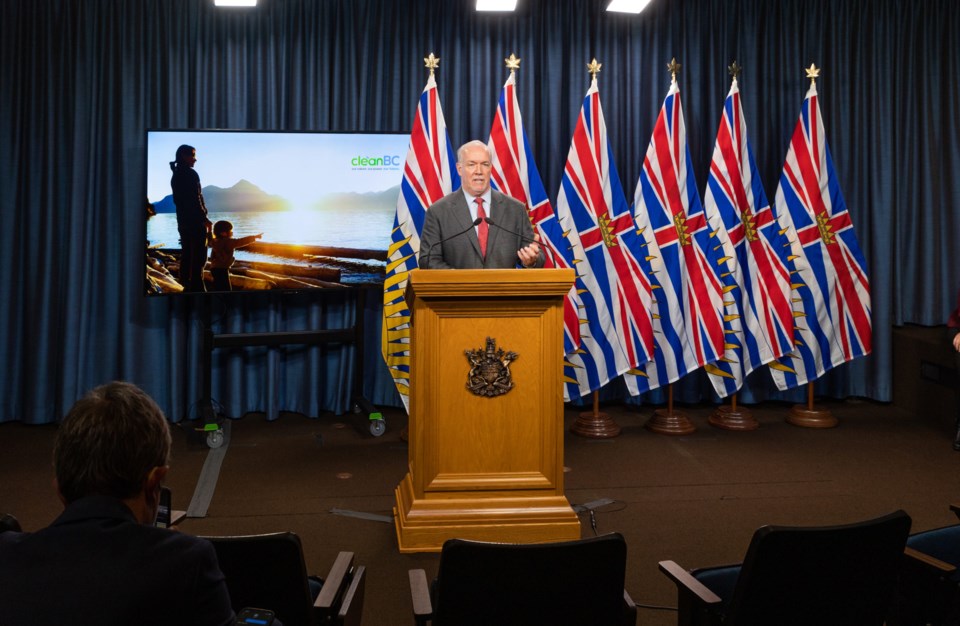BC has introduced version 2.0 of its climate plan, but for many people it’s hard to reconcile the rhetoric of its lofty goals with the reality of continued subsidies for the oil and gas sector, as well as old growth logging.
Premier John Horgan cited three devastating wildfire seasons in the last four years, the record heat dome last summer, and a historic weekend “weather bomb” as critical reminders that climate change is a current and active threat to the province.
“I think all British Columbians, and indeed, all Canadians are focused on making progress on climate change not sometime in the future, but right now,” said Horgan.
“The threat is no longer decades away, it is here with us in everything that we do.”
The plan fills the gaps in government’s 2018 climate plan, pushing heavily on electrification, zero-emission vehicles and a crackdown on the natural gas sector to reach the target of a 40 per cent reduction in greenhouse gas emissions from 2007 levels by 2030.
Horgan picked up quick endorsements from Clean Energy Canada’s Merran Smith, as well as former BC Green leader Andrew Weaver.
But most environmental groups say it fell well short, with several of the big plans, such as “near elimination of industrial methane emissions by 2035” amounting to nothing more than an IOU note for a future plan after consultation with the industry.
“While the roadmap to 2030 includes some strong new policies – particularly in the transportation sector – too much of it reads like a plan to make a plan,” said Ecojustice.
Most groups praised the proposal to require zero-carbon new construction in BC’s building code by 2030, as well as bump up by five years the requirement for 100 per cent of new vehicle sales to be zero emission by 2035.
They also praised the target of a 25 per cent reduction in kilometres driven by BC vehicles, plus a 30 per cent increase in walking - though it was unclear how the government intends to actually meet, or even track, those metrics by 2030.
All environmental groups zeroed in on the almost $7 billion in subsidies BC has spent encouraging natural gas production, including fracking, which the government is reviewing but in the meantime continues.
“You can’t claim to have a plan to meet our 2030 climate target without the details of how you are going to address the industry that is at the core of the problem,” said Kiki Wood of Stand.earth.
Environment George Heyman said the climate plan continues to account for extra pollution caused by the LNG Canada project in Kitimat, though government officials in a background briefing dodged the question of whether that project would be bound to pursue electrification if it chose to expand production in the future.
Online, several environmental groups took shots at the government’s continued logging of old growth forests as well, questioning how the premier could trumpet a plan that addresses a climate emergency while logging the province’s most precious forests.
Horgan said more forestry policies are coming soon, as well as additional deferrals of old growth logging. But he acknowledged old growth, in addition to oil and gas, are issues in which his government still has work to do.
“Our position on these issues is to make progress,” he said.
Still, it’s clear the Horgan government is wrestling with a major disconnect in the minds of many of its supporters.
On the one hand, it wants to be seen to be doing everything possible to address the climate emergency and meet its ambitious 2030 goals.
On the other hand, it’s allowing ancient trees to be cut down and using public funds to encourage fossil fuel production.
“The province has wind in its climate sails,” said the Pembina Institute in a statement. “However, a lack of willingness to take a firm stance on the future role of gas will threaten to throw B.C. off course.”
The David Suzuki Foundation and West Coast Environmental Law echoed the concerns. As did BC Green leader Sonia Furstenau.
The criticisms on old growth and oil and gas aren’t new. They’ve been dogging the government for more than a year. Its failure to address them before a refresh of its climate plan, cost the BC NDP some of the praise the party might have otherwise have expected from its big-vision plan.
Rob Shaw has spent more than 13 years covering BC politics, now reporting for CHEK News and writing for The Orca. He is the co-author of the national best-selling book A Matter of Confidence, and a regular guest on CBC Radio.
SWIM ON:
- Rob Shaw on the wild backstory that led to the NDP government thumbing its nose at BC’s information commissioner – and Premier John Horgan listing his iPhone apps.
- Justin Trudeau’s belated visit to the Kamloops Indian Residential School site was important, but much more important is Canadians learning what really happened there, says Jody Vance.
- Dene Moore: BC’s forestry management practices have needed updating for years – and while there are some positive steps in the NDP’s new bill, it leaves a lot left to do, especially for forestry-dependent communities.



